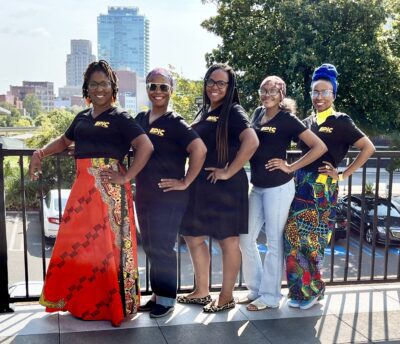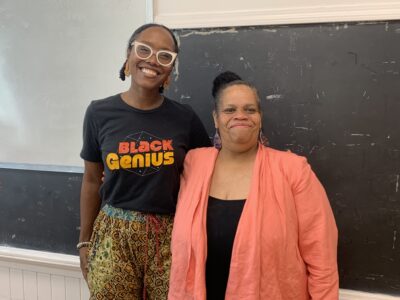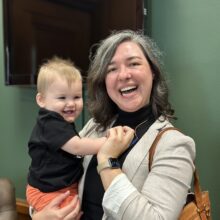
At the YWCA in Asheville, the process of eliminating the use of exclusionary discipline in early childhood care and education begins with taking care of the teachers.
Before the pandemic, Black children across the country were already being disproportionately suspended, expelled, or otherwise excluded from their early childhood care/education settings.
As EdNC has previously reported, the negative effects of exclusionary discipline on brain development, mental health, future educational outcomes, and family well-being are so serious that the practice is often referred to as the “preschool-to-prison pipeline.”
Since 2020, teachers nationwide report that students — from toddlers to teens — are demonstrating more challenging behaviors than before. Experts worry this puts Black children at even higher risk of exposure to exclusionary discipline practices.
Dr. Amieris Lavender, chief program officer of YWCA Asheville, is one of those experts.
“We have families of color who are experiencing extreme amounts of grief on top of this experience, and children are exhibiting higher levels of behaviors than they ever have before,” Lavender said.
Combating those conditions — not just for children and their families, but for staff as well — is the mission of the YWCA, which is “dedicated to eliminating racism, empowering women and promoting peace, justice, freedom and dignity for all.”
“Living the truth of the values of our mission is why we have to start with ourselves,” Lavender said.
‘Exhausting and ridiculous and crazy’
Lavender’s own experiences working for YWCA-Asheville during the pandemic informed her approach to eliminating exclusionary discipline at their 5-star licensed child care center.
She became the chief program officer in January 2021. It’s a role that oversees a variety of programs, but she suddenly found herself in an early childhood education crash course.
“I don’t know if I would have been as involved or knowledgeable of child care if I didn’t have to go get my substitute so I could be in a classroom, if I didn’t have to experience that day, if I didn’t wake up and meet the parents and carry the baby, and do all of the things,” Lavender said.
Lavender said that after helping with child care at the center for two years, she found the conditions to be “exhausting and ridiculous and crazy.”
“Having had that experience, it gave me, probably, way more compassion and understanding of where we needed to show up better,” she said.
Combining that understanding with her background in how organizational culture impacts the ability to implement reforms led her to develop a teacher-focused strategy for eliminating exclusionary discipline starting in 2022.
She knew they had to make changes to their working conditions before they could introduce new trauma-informed strategies for keeping young students in their classrooms.
“There’s a level of coaching needed, but I also know how people learn isn’t in dire stress,” Lavender said.
Setting conditions for change
Last year, Lavender and her team started by looking at how to create more stability in the lives of the center’s staff.
“I truly believe we can’t ask people to change unless we set conditions for change, which is that stability,” Lavender said.
One way YWCA Asheville did that was by pausing enrollment at the center. That gave staff some consistency, knowing how many students they would have in their classrooms, and who those students and their families were.
They also raised teachers’ wages.
“People in our community were making what, 11, 12 bucks? It’s unforgivable,” Lavender said. “They’re out there making $12 to be in a room of 18 three-year-olds? All of it is just laughable.”
But one of the biggest changes was to the center’s hours.
“We had 12-hour days, you know,” Lavender said. “That’s not even pedagogically, like, sound.”
Starting from a place of what’s best for students, then moving to what’s best for teachers, YWCA Asheville now has students arriving later and leaving earlier. This creates “breathing room” for teachers and staff at the beginning and end of each day.
That wasn’t a popular move with parents.
Lavender said parents sent her charts mapping the cost of care in relation to the center’s hours, trying to get the new hours changed. She took it all in stride.
“I love a graph, this is beautiful, but it’s still a no from me,” Lavender said she told parents.
For Lavender, it comes down to one fundamental question.
“Are we functioning as a service to aid workers, or to develop minds?” Lavender said. “That’s the tension for me that exists with child care.”
As Lavender sees it, child care providers and families are being forced into conflict because of employer policies.
When a parent expresses frustration over the center’s hours, Lavender redirects that frustration toward the employer’s treatment of that parent employee.
“Why are you the only one who can open a building? Why are you getting tardy points? Why do you have to do punitive time? Why are they watching your keystrokes? It’s so gross,” Lavender said. “You have some panopticon employer calling people out, so now me and your kid’s teacher are getting yelled at. We need to move this around.”
That’s why she participates in the Asheville-Buncombe Preschool Planning Collaborative, a group of family members, community leaders, educators, employers, and neighbors who believe that investing in young children is the best way to invest in their community’s future.
“Some of our work in the collaborative has been with the Chamber (of Commerce) to say, like, ‘What is a family friendly employer?’” Lavender said.
Feeling safe and happy
All of this is just the first step in the YWCA Asheville’s three-year plan to end the preschool-to-prison pipeline that starts with exclusionary discipline practices in students’ earliest years.
The project’s second year will emphasize training through continuing education and professional development, with a focus on trauma-informed practices, self-regulation, and racial and gender justice.
The third year will include evaluating progress and seeing what’s needed next.
“One of my hopes is that an outcome of this project would be that there is a set of best practices that our community agrees to follow,” Lavender said. “Children should just walk into a building and feel safe and happy.”
With that goal in mind, Lavender’s guiding question will remain, “Before I ask you to change, am I meeting your needs?”
Editor’s note: This article was updated to correct the year Dr. Amieris Lavender became chief program officer of the YWCA Asheville. EdNC apologizes for the error.
Recommended reading



